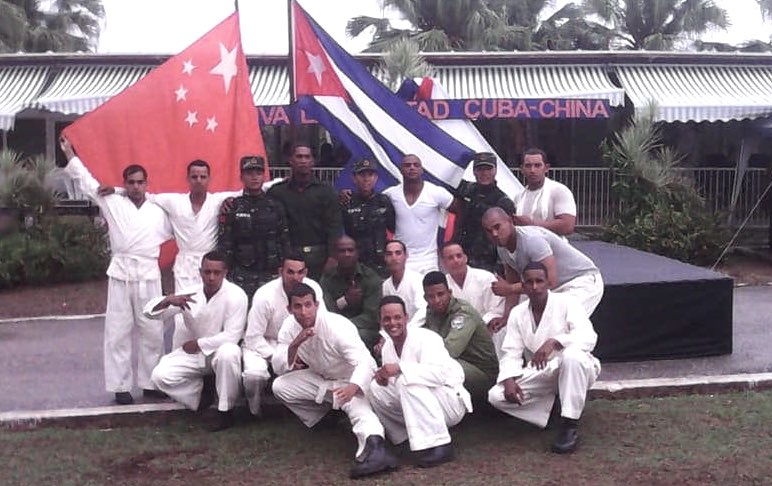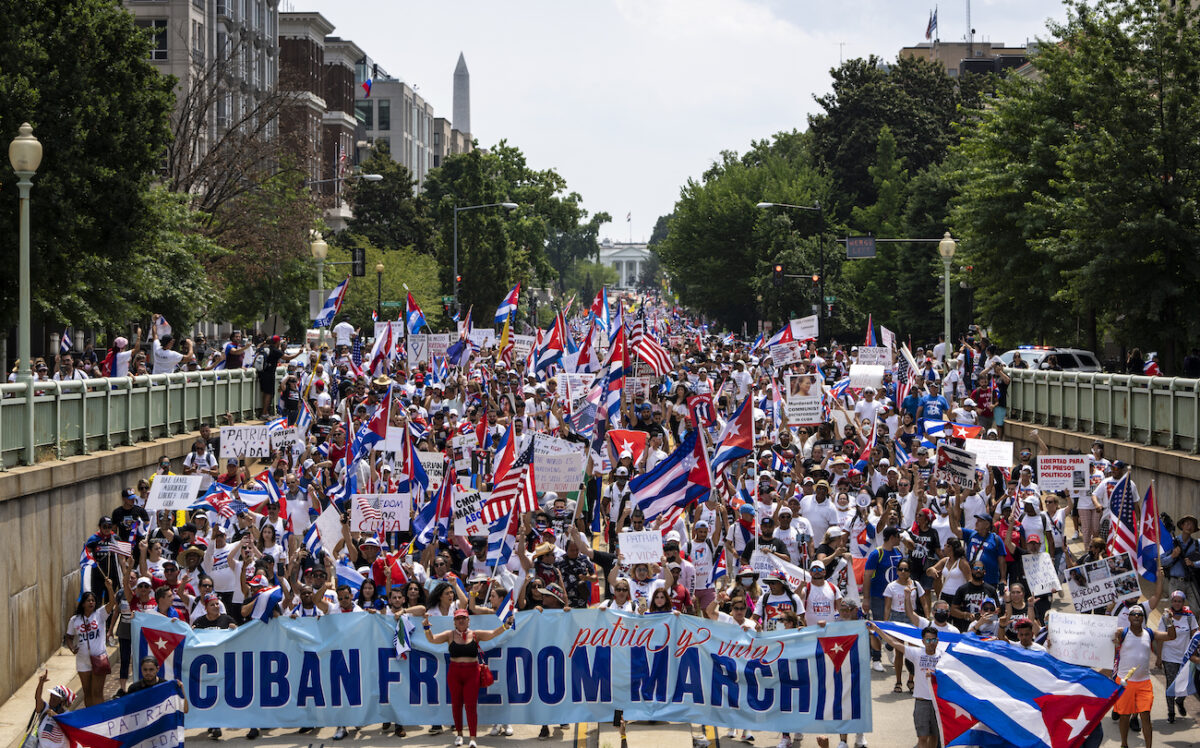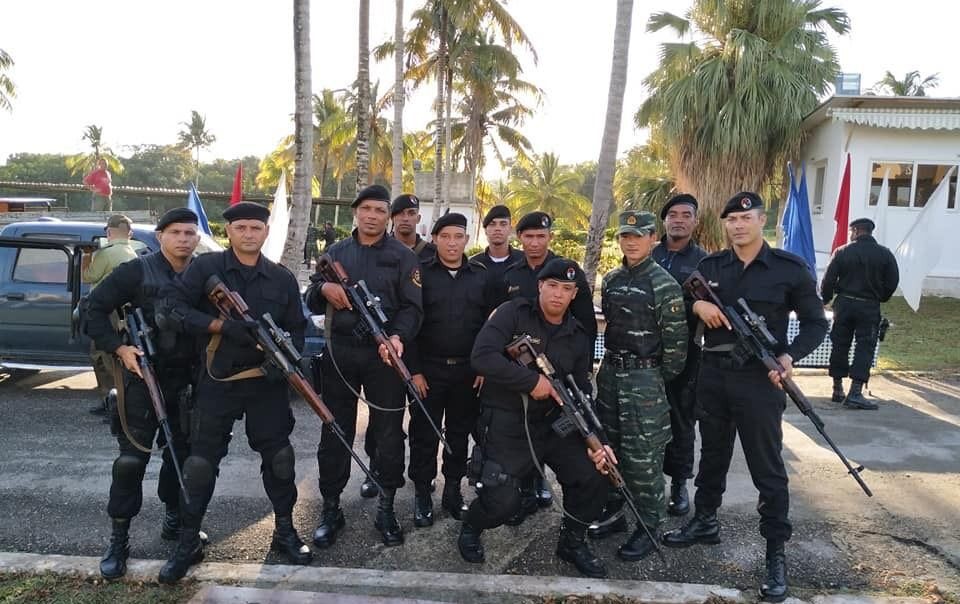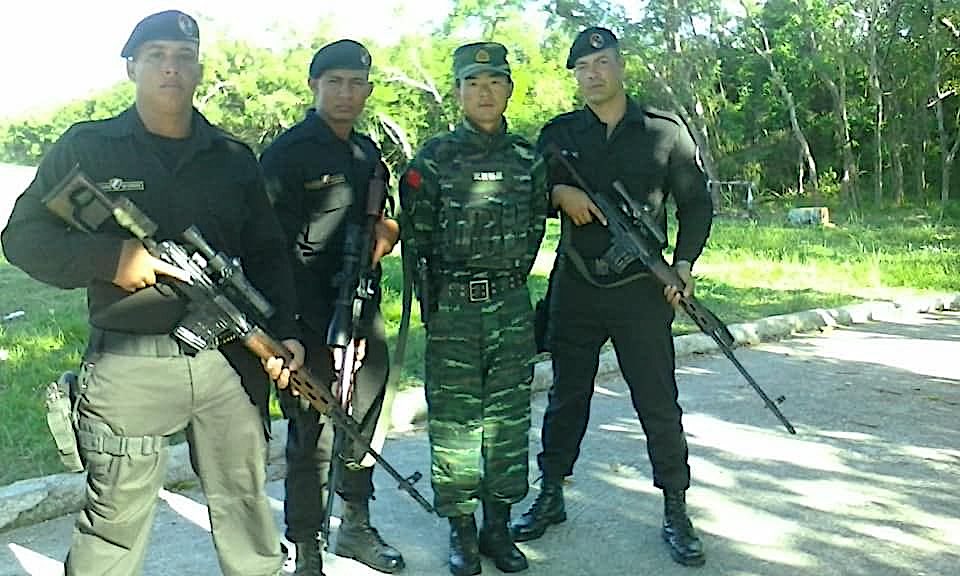Cuban military and police forces responsible for clamping down on demonstrators have received “counter-terrorism” training from Chinese paramilitary, reports from Chinese state media show.
Rare anti-government protests erupted around the island in July as citizens took to the streets calling for greater freedoms and better living conditions. While nearly two dozen countries worldwide have voiced support for the protesters, the ruling communist regime has responded by launching a violent repression, actions supported by Beijing.
Records going back to a decade ago show that Cuban authorities may have learned some tactics from their Chinese counterparts, who provided training and other support in the name of combating terrorism.
The Chinese paramilitary, known as the People’s Armed Police (PAP), began sending personnel to train their Cuban counterparts as early as 2008, Chinese state media reported. In 2019, the PAP demonstrated combat skills at an event in China, which drew praise from visiting Cuban security officials.
A specialized paramilitary force tasked with quelling domestic unrest, the PAP played a major role in crushing protests in the far-west region of Xinjiang over the years. One squadron that had killed 91 “rioters” in the region was recognized with special honors by Chinese leader Xi Jinping in July. In Hong Kong, the PAP also joined local police on the frontlines to observe pro-democracy protests last year, Reuters reported, citing anonymous sources.
It’s unclear when the PAP’s training in Cuba first began. The earliest documented training, based on media reports, took place for about two months in Havana starting November 2008. Among the more than 90 trainees who took part, two-thirds of them belonged to the Cuban Interior Ministry’s “special forces,” according to Chinese state media. The special forces unit, known as the “Black Berets,” is an elite group of the Revolutionary Armed Forces, the regime’s military. The remaining trainees were military officers.
The four Chinese PAP trainers taught the Cuban officers mixed martial arts, hostage rescue, and handling “large scale riots,” the report said. At the end of their stay, they were awarded by the Interior Ministry with its highest distinction for their “special contribution.”

In April 2016, the PAP in Ningxia, a region in central-north China, sent six officers to the Cuban Ministry of the Interior’s national special combat training school to teach a one-month training program. The courses involved more than 160 skills across six categories, including tactical shooting, Chinese martial arts, Tai Chi, and tactics to subdue violence, according to an article from a Chinese army-run site headlined “Armed Police Return With Honors.”
The Cuban side, impressed by the progress of the training, incorporated the content into their country’s military training agenda, according to another article from the site.
Photos from the 2016 training released by Chinese media, including a handful recently unearthed by Cuban media ADN, show the Cuban officers donning their signature black uniforms and black berets with their Chinese trainers.
Beginning on July 11, thousands of Cubans began taking to the streets to voice their frustration with the 62-year-old communist regime and with their living conditions, the largest demonstrations the country has seen since the 1990s. In response, the regime carried out mass arrests, cut off internet access, and deployed security and police forces, including the Black Berets, to take over cities and towns.

The United States sanctioned the Cuban defense minister and the Black Berets on July 22 for their violent suppression of the protests, which reportedly saw arrests of roughly 500 activists.
On July 30, the Biden administration further imposed sanctions on the Cuban police force and two of its leaders for their assaults on demonstrators, including the arrest of a Catholic priest who tried to defend young protesters, the beating of several minors, and the use of clubs to break up peaceful protests.
“Cubans deserve to have pride in their homeland and the basic necessities of life that the Cuban Communist Party’s failed system has been unable to deliver,” Secretary of State Antony Blinken said in a statement announcing the sanctions.

Projecting Power Overseas
Chinese paramilitary forces have played a key part in Beijing’s ambition to project power and expand the country’s military influence beyond Chinese borders.
The PAP set up a “China Peace-keeping Civil Police Training Center” near Beijing to train foreign police in 2000, and two years later began building another, which it said would be Asia’s largest.
As of 2009, the PAP had sent delegations to more than 30 countries “for bilateral or multilateral counter-terrorism exchanges,” according to state-run media China Daily.

In January 2016, a Chinese counter-terrorism law took effect to allow the Chinese military and the PAP to send officers overseas to combat terrorism.
The PAP has made some headway in central Asia, running an outpost in Tajikistan in the region bordering China and Afghanistan since 2016. One Tajik observer estimates the facility to contain hundreds of personnel and around 20 lookout towers, according to a 2020 report by the U.S.–China Economic and Securities Review Commission.
During a 2019 anti-terrorism forum hosted by the PAP in Beijing, officers performed their latest sniper tactics and were said to have received rounds of applause from more than 240 foreign officials attending the event, according to Chinese state media Xinhua. One attendee, an expert with Cuba’s Ministry of the Interior told the outlet that he got a lot of inspiration for the training in his home country and expressed hopes to increase such exchanges.
PAP isn’t the sole agency involved in Beijing’s global law enforcement push. An internal document The Epoch Times obtained in 2020 shows that one police college in Kunming, the capital of China’s Yunnan Province, conducted 115 training sessions with more than 2,500 law enforcement officers from 62 developing countries between 2002 and 2017. Over the course of 16 years, the college trained more than 300 officers from Laos. The same college had pledged to provide short- and mid-term training for 2,000 Southeast Asian officials from 2016 to 2020, according to Xinhua.
The goal of these training programs was to “build connections” and service the regime’s Belt and Road Initiative (BRI), according to the document. BRI, a billion-dollar infrastructure project aimed at bolstering Beijing’s economic and political power worldwide, has attracted scrutiny over its role in exporting the regime’s model of techno-totalitarianism and saddling developing countries with high levels of debt.





